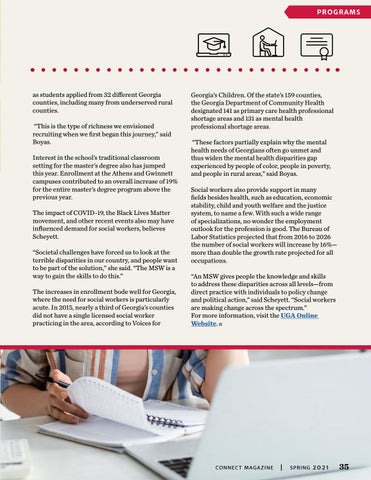PROGRAMS
as students applied from 32 different Georgia counties, including many from underserved rural counties. “This is the type of richness we envisioned recruiting when we first began this journey,” said Boyas. Interest in the school’s traditional classroom setting for the master’s degree also has jumped this year. Enrollment at the Athens and Gwinnett campuses contributed to an overall increase of 19% for the entire master’s degree program above the previous year. The impact of COVID-19, the Black Lives Matter movement, and other recent events also may have influenced demand for social workers, believes Scheyett. “Societal challenges have forced us to look at the terrible disparities in our country, and people want to be part of the solution,” she said. “The MSW is a way to gain the skills to do this.” The increases in enrollment bode well for Georgia, where the need for social workers is particularly acute. In 2015, nearly a third of Georgia’s counties did not have a single licensed social worker practicing in the area, according to Voices for
Georgia’s Children. Of the state’s 159 counties, the Georgia Department of Community Health designated 141 as primary care health professional shortage areas and 131 as mental health professional shortage areas. “These factors partially explain why the mental health needs of Georgians often go unmet and thus widen the mental health disparities gap experienced by people of color, people in poverty, and people in rural areas,” said Boyas. Social workers also provide support in many fields besides health, such as education, economic stability, child and youth welfare and the justice system, to name a few. With such a wide range of specializations, no wonder the employment outlook for the profession is good. The Bureau of Labor Statistics projected that from 2016 to 2026 the number of social workers will increase by 16%— more than double the growth rate projected for all occupations. “An MSW gives people the knowledge and skills to address these disparities across all levels—from direct practice with individuals to policy change and political action,” said Scheyett. “Social workers are making change across the spectrum.” For more information, visit the UGA Online Website.
C O N N E C T M A GA Z IN E
|
S P R IN G
2021
35
